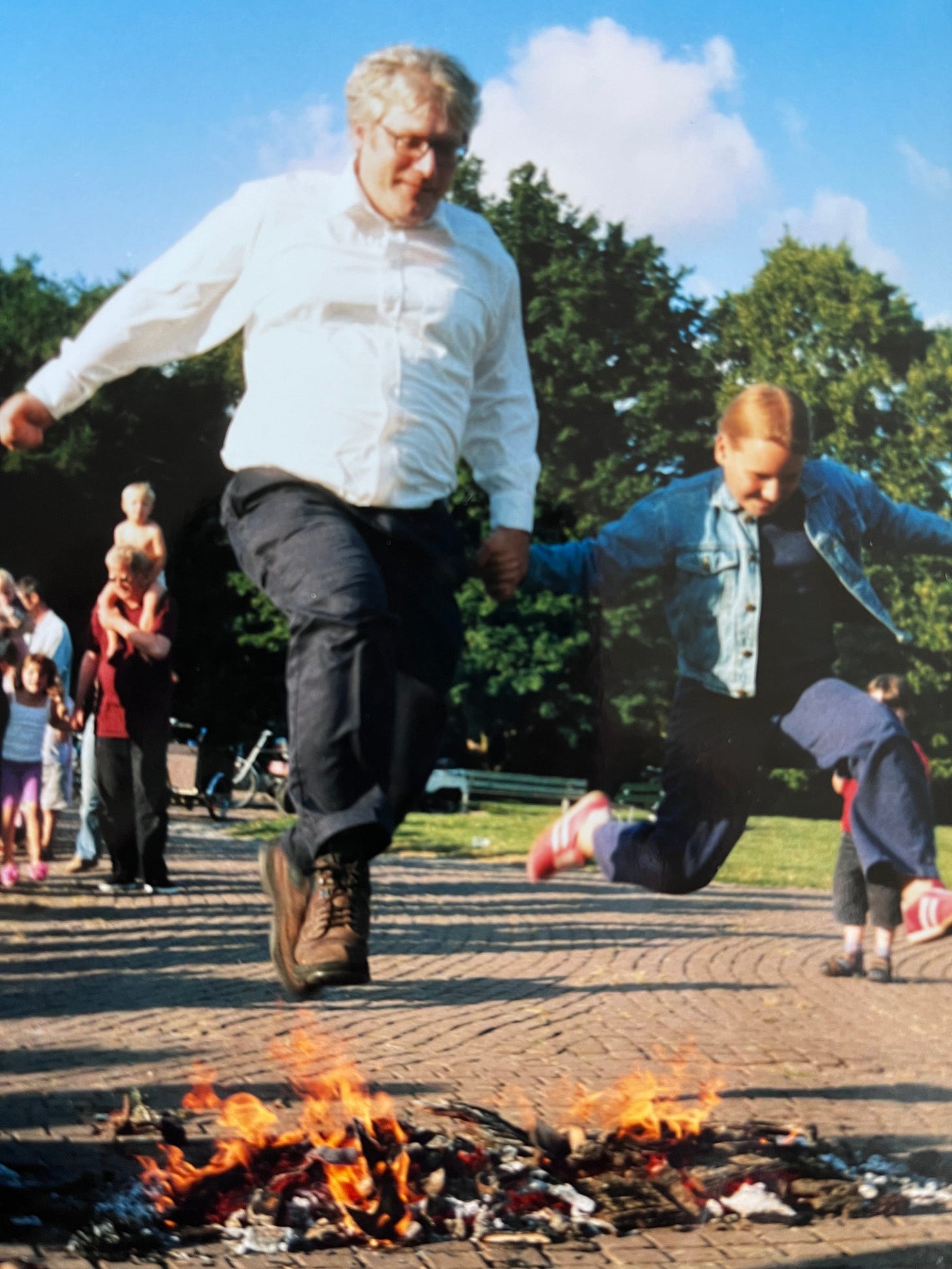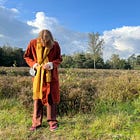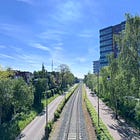Burnout beginnings PART 1
The origin story of my fatigue: the almost lifelong buildup towards burnout
(This is an audio version of this letter, recorded by me, imperfectly and without editing. I hope you enjoy listening.)
Hello, I’m Philippine and to be honest, I feel like a beginner at life – I am forever trying to make sense of it. You can find my attempts at this, plus reflections, musings and experiences right here, in my newsletter. Subscribing is free! For everyone who feels like a beginner at life, and wants to connect in some way.
When my burnout began exactly, I don’t know. When I go back and think I’ve found its starting point, I always realise I can go back in time even further. Trying to think of a moment before burning out seems about equally impossible. Just when I think I’ve got it – a moment when I wasn’t tired, when my energy was more or less balanced – it slips away from me, remembering I was already tired before.
For the sake of simplicity I usually say that I burnt out at the start of 2020. At the end of January that year I stopped working, and in March I finally realised I was truly – and severely, it would become apparent – burnt out. But of course that burnout didn’t come out of nowhere, there was a build up.
When I was ten years old I had to stay home from school for several months, because of how tired I was. Even for something fun I didn’t have the energy. I remember that my mum and I were going to go shopping – something I considered fun – but after what was a quick errand in one small shop (this wasn’t even ‘officially’ a part of the shopping yet), I’d run out of energy and wanted to go home. Moreover, and bear in mind here that food is pretty much the love of my life, even preparing a sandwich for myself was too much during this time.
My mum dates back my exhaustion further still, saying that I started to be more tired generally from about the age of seven or eight, which is when school started to become more serious, also having to stay there till later in the day, not to mention the fact that social communication and friendships become more complex at that age – this is also around the time that I was bullied occasionally. All of it combined made me feel so miserable that I begged and cried every morning, asking if, please, I could stay home that day. Until eventually my body couldn’t take it anymore and I physically and mentally lost the energy to go to school.
I got some rest, therapy, and my main bully moved to a different school. I returned and had a slightly better time in the last few years of primary school. In secondary school, things weren’t too bad to start with either, but when, at fourteen, I moved to a different class with a higher level and pace, I lost both friends, time and energy. I was intelligent enough for the class, but my way of working is detail-oriented and thorough, meaning that homework took me a lot of time and energy. And due to my at the time undiagnosed autism (I only realised I’m autistic a few years ago in my late twenties), school itself plus its bustle and precarious social side of things added to the pressure too.
In my last four years of school I thus lived on the social periphery, where my life had reduced itself to school, homework, and telly. School homework telly, school homework telly, school homework telly, with the in-between moments woven through: cycling to school, eating my dinner, drifting off to sleep – during these I daydreamed about a different life, one where I had really good friends, a boyfriend, and so on, but this fantasy felt so out of reach that I sadly never saw it as a real alternative I could work towards.
I remember dreading the inevitable question every Monday: did you do something fun this weekend? The answer was always the same – no, just homework. School, telly, homework, it’s all I had the energy and time for. Or maybe I should say it’s all I had the time for, not energy, because I have the feeling that I was already spending more of that than I had, slowly starting to build towards that burnout.
I could recover a bit during my gap year, although I simultaneously kept spending energy: working in a theatre in the role of bartender, usher and wardrobe person, and often going out afterwards to the pub next door. I both liked and disliked this, enjoying being part of a group (we worked there with about a 100 people of student age), and still always feeling only semi a part of it. I didn’t drink alcohol and couldn’t quite figure out how to truly participate.
Anyway, at the end of that year I was sort of rested enough, or so I thought, to start studying for a BA in philosophy at the University of Amsterdam. I was even clever enough not to immediately move out of my parents house, foreseeing that two such big changes would be too much all at once. And yet it was too much anyway.
Towards the end of the first year – having learnt from my school experience and therefore having tried very hard to both study and socialise this time – I was exhausted. A vitamin D deficiency. And at the time I thought that was all it was…
That summer I continued to feel tired, but in September I started my second year, thinking that the vitamin tablets should have done most of their work by then. For some reason I had thought it a good idea to follow an extra module this semester, adding up to 150% of full-time hours. This was a lot, but I kept on pushing through, thinking it was something to be proud of (I suppose that in some way it was, but it most certainly isn’t what I should have been doing).
On top of that I moved out of my parents’ house that January, and into a sea container turned studio (not as sad as it sounds, I promise). I now had to both get used to this huge change and run a little household on top of my coursework. Nevertheless, I was confused as to why I struggled so much to get myself studying during the first few months of living there. I didn’t understand why, which apparently made me think there simply was no good reason, and so I kept going, even if that meant I had to stay with my parents again for months on end, because I simply couldn’t cook and clean as well.
Until I reached a point at which it counted as a good day when I managed to study just for an hour. With hindsight it’s so obvious to me that I was overworked, but at the time I was merely trying to find out what was wrong by going to the doctor and having my blood taken.
My days looked like attempting to study, if ‘lucky’ actually study (a tiny bit), and mostly not doing much of anything. Even a walk didn’t invigorate me, it only tired me more. I watched telly and ate cornettos, and I told my friends I was too exhausted to meet up with them. But still, I asked for extensions and submitted my essays within a week or two of the summer break.
It’s clear by now, right? Of course I went back for my third year as if I was completely rested and ready. By the time I had to write my dissertation I was staying with my parents again to lighten my load a little. And then the moment was finally there, I did it, I was done with my BA, in three years and without retakes, just like you’re supposed to, which was seemingly more important to me than my own wellbeing. I had no idea. I didn’t even realise there was another way, so deeply was I trapped by ‘supposed to’ and ‘should’.
Finally, something changed. I did something entirely different for a year: I took part in a foundation/introduction year for drama school. It was mostly acting, which I loved, and some devising and directing, which I started to discover there suited me even better. It was full-time, but not too full-time; there was some homework, but not much. It was mostly very fun and wholesome. Even though it took me a while to make friends – as it always does, hello autism – in the end I truly felt like a part of the family.
Coming out of this warm bath, however, I went back to uni to follow some modules in theatre studies, so that I could apply to an MA in the field. It was only part-time, but that combined with an evening or two of work and a Saturday internship at the youth theatre school where I’d just finished my foundation year, was a lot to me. Especially with the added bonus of applying for two masters, one in Amsterdam, where I already lived, one in London where I wanted to live. I got into both and with fear and utter excitement accepted my place at an MA in London that was part theory and part practice – mostly directing and playwriting.
No summer break for me before the big adventure, though. Instead I needed to make sure I could actually go. Applying for grants, looking for a room, filling out forms, and so on and on and on. Honestly it basically constituted a full-time job, that’s how much work and stress it cost – I needed a UK bank account to arrange a room, but I needed to already live in the UK to open a bank account, that kind of thing. It was nightmarish.
Whilst arranging all of this, I actually stayed in the UK for six weeks, doing a language course. This was both wonderful and exhausting. I got sick three times during this time (stress, anyone?). And when I wasn’t ill, I had to wake up early to take the hour and a half or so journey – with three different vehicles in the thirty plus degrees hot weather of that summer during rush hour (hello stranger’s armpit) – to get to class in time. Then come back to sit behind my laptop or view a room and attempt to charm my potential flatmates. In the meantime I also managed to make some friends (I mean, two, let’s not exaggerate), actually find that room, dance in blues bars (again, just the one), and visit museums.
I was home in Amsterdam for another month before officially moving to London. Nevertheless, I never did finish my ‘moving to London’ to do list. I thought I’d finish it in the first two weeks of living there, before my course started, but it just didn’t happen (I never got round to finding a GP or dentist, for example). Instead I was busy turning 25, installing a dating app, getting to know my lovely flatmates, settling into my room, and, mostly, preparing for my course, buying books and making a start with reading them.
And so, without a true break, I rolled into a full-time master’s in a foreign country, where I spoke the language sort of fluently but was still actively translating in my head half the time, where I lived with flatmates for the first time in my life – everything new and different. This was scary, lonely, utterly exhausting and incredibly amazing all at once. It was like I was truly living my own life, my own adventure, liberated by an environment not only unfamiliar to me, but also one that didn’t know me yet, no previous conceptions, no expectations. I was free.
But of course I wasn’t free from myself, I still carried my own patterns, and, unaware of it at the time, fatigue from all of the years that had gone before, all of the pushing through and all of the picking it back up before I was ready. Just like now – I wasn’t ready, I wasn’t rested. Instead I was ready to be launched straight into burnout.
Stay tuned for PART 2 in which I’ll write about my time in London and the ultimate beginning of my burnout. Spoiler: I pushed through some more – goodness, I really had to learn the hard way, didn’t I?
What was the buildup towards your burnout, or other crisis, like? Which lesson did you have to learn the hard way?
If you liked this post, you may also like:








'I wasn’t free from myself' ♡
Philippine, you might enjoy my burnout story, which is similar in some ways :) https://neurodivergentnotes.substack.com/p/finding-hope-and-beauty-in-the-fallow